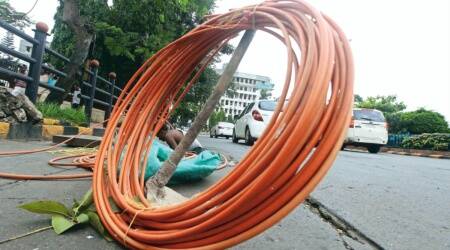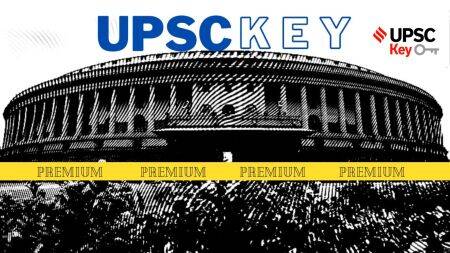Lebanon and Sri Lanka may be a world apart, but they share a history of political turmoil and violence that led to the collapse of once-prosperous economies bedeviled by corruption, patronage, nepotism and incompetence.
The toxic combinations led to disaster for both: Currency collapse, shortages, triple-digit inflation and growing hunger. Snaking queues for gas. A decimated middle class. An exodus of professionals who might have helped rebuild.
There usually isn’t one moment that marks the catastrophic breaking point of an economic collapse, although telltale signs can be there for months – if not years.
When it happens, the hardship unleashed is all-consuming, transforming everyday life so profoundly that the country may never return to what it was.
Best of Express Premium
 PremiumNeed to accelerate reform pace in energy transition: CEO, Niti Aayog
PremiumNeed to accelerate reform pace in energy transition: CEO, Niti Aayog
 Premium5G: All spectrum may not get sold; govt stares at shortfall
Premium5G: All spectrum may not get sold; govt stares at shortfall
 PremiumWe need to formulate a structured gaming law that allows players to enjoy…
PremiumWe need to formulate a structured gaming law that allows players to enjoy…
 PremiumUPSC Key-June 24, 2022: Know why ‘Sorrow of Assam’ to ‘Sri La…More Premium Stories >> |Explained: How bad is the crisis in Lebanon?
PremiumUPSC Key-June 24, 2022: Know why ‘Sorrow of Assam’ to ‘Sri La…More Premium Stories >> |Explained: How bad is the crisis in Lebanon?
Experts say a dozen countries – including Egypt, Tunisia, Sudan, Afghanistan and Pakistan – could suffer the same fate as Lebanon and Sri Lanka, as the post-pandemic recovery and war in Ukraine spark global food shortages and a surge in prices.
Roots of crisis
The crises in Lebanon and Sri Lanka are rooted in decades of greed, corruption and conflict.
Both countries suffered a long civil war followed by a tenuous and rocky recovery, all the while dominated by corrupt warlords and family cliques that amassed enormous foreign debt and stubbornly held on to power.
Various popular uprisings in Lebanon have been unable to shake off a political class that has long used the country’s sectarian power-sharing system to perpetuate corruption and nepotism. Key decisions remain in the hands of political dynasties that gained power because of immense wealth or by commanding militias during the war.
Amid the factional rivalries, political paralysis and government dysfunction has worsened. As a result, Lebanon is one of the most backward Middle East countries in infrastructure and development, including extensive power cuts which persist 32 years after the civil war ended.
|Mired in crises, Lebanon marks one year since horrific blast
In Sri Lanka, the Rajapaksa family has monopolised politics in the island nation for decades. Even now, President Gotabaya Rajapaksa is still clinging to power, although the family dynasty around him has crumbled amid protests since April.
Experts say the current crises in both countries is of their own making, including a high level of foreign debt and little invested in development.
Moreover, both countries have suffered repeated bouts of instability and terrorist attacks that upended tourism, a mainstay of their economies. In Sri Lanka, Easter suicide bombings at churches and hotels killed more than 260 people in 2019.
Lebanon has suffered the consequences of neighbouring Syria’s civil war, which flooded the country of 5 million with about 1 million refugees.
|Explained: What led to Sri Lanka’s economic crisis, and who’s helping?
Both economies were then hit again with the onset of the coronavirus pandemic.
Tipping points
Lebanon’s crisis began in late 2019, after the government announced new proposed taxes, including a $6 monthly fee for using Whatsapp voice calls. The measures set a spark to long smouldering anger against the ruling class and months of mass protests. Irregular capital controls were put in place, cutting people off from their savings as the currency began to spiral.
In March 2020, Lebanon defaulted on paying back its massive debt, worth at the time about $90 billion or 170 per cent of GDP – one of the highest in the world. In June 2021, with the currency having lost nearly 90 per cent of its value, the World Bank said the crisis ranked as one of the worst the world has seen in more than 150 years.
In Sri Lanka, with the economy still fragile after the 2019 Easter bombings, Gotabaya pushed through the largest tax cuts in the country’s history. That sparked a quick backlash, with creditors downgrading the country’s ratings, blocking it from borrowing more money as foreign exchange reserves nosedived.
|Explained: Why is Lebanon such a mess?
On the brink of bankruptcy, it has suspended payments on its foreign loans and introduced capital controls amid a severe shortage of foreign currency. The tax cuts recently were reversed.
Meanwhile the Sri Lankan rupee has weakened by nearly 80 per cent to about 360 to $1, making the costs of imports even more prohibitive.
“Our economy has completely collapsed,” the prime minister said Wednesday.
|Sri Lankan’s economy ‘has collapsed’, says PM Wickremesinghe
Upended lives
Before this latest descent, both Lebanon and Sri Lanka had a middle-income population that allowed most people to live somewhat comfortably.
During the 1980s and 1990s, many Sri Lankans took jobs as domestic workers in Lebanese households. As Sri Lanka began its postwar recovery, they have been replaced by workers from Ethiopia, Nepal and the Philippines.
The recent crisis forced most Lebanese to give up that luxury, among others. Almost overnight, people found themselves with almost no access to their money, evaporated savings and worthless salaries. A month’s salary at minimum wage isn’t enough to buy 20 liters (5 1/4 gallons) of gasoline, or cover the bill for private generators that provide homes with a few hours of electricity a day.
|India team in Lanka: Ready to aid recovery via investments
At one point, severe shortages of fuel, cooking gas and oil led to fights over limited supplies – scenes now replicated in Sri Lanka. Cancer drugs are often out of stock. Earlier this year, the government even ran out of paper for new passports.
Tens of thousands of professionals, including doctors, nurses and pharmacists, have left the country in search of jobs.
Similarly, Sri Lanka is now almost without gasoline and faces an acute shortage of other fuels. Authorities have announced nationwide power cuts of up to four hours a day and asked state employees not to work on Fridays, except for those needed for essential services.
|Lebanon on edge as protests persist, caretaker PM pleads for new govt
The UN World Food Program says nearly nine of 10 Sri Lankan families are skipping meals or otherwise skimping to stretch their food, while 3 million are getting emergency humanitarian aid.
Doctors have resorted to social media to seek critical supplies of equipment and medicine. Growing numbers of Sri Lankans want passports to go overseas to search for work.
Other disasters
In addition to the political and financial turmoil, both countries have faced disasters that worsened their crises.
On Aug. 4, 2020, a catastrophic explosion s truck Beirut’s port, killing at least 216 people and wrecking large parts of the city. The blast, widely considered one of the largest non-nuclear explosions in history, was caused by the detonation of hundreds of tons of ammonium nitrate that was stored in a warehouse for years. The dangerous material was housed there apparently with the knowledge of senior politicians and security officials who did nothing about it.
There was widespread outrage at the traditional parties’ endemic corruption and mismanagement, which were widely blamed for the calamity.
|Explained: Why the Beirut explosion has caused widespread anger in Lebanon
Sri Lanka faced a disaster in early 2021, when a container ship carrying chemicals caught fire off the coast of the capital of Colombo. It burnt for nearly two weeks before sinking while being towed to deeper waters.
The burning ship belched noxious fumes and spilled more than 1,500 tons of plastic pellets into the Indian Ocean, which were later found in dead dolphins and fish on the beaches.
Fishing was banned in the area because of health risks associated with the chemicals in the water, affecting the livelihoods of some 4,300 families, who still have not received compensation.
Express Subscription Check out our special pricing for international readers when the offer lasts Subscribe Now

